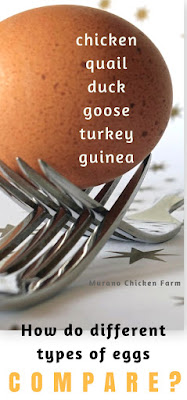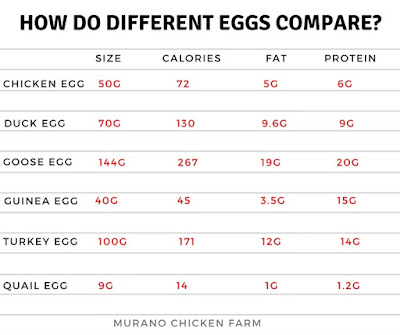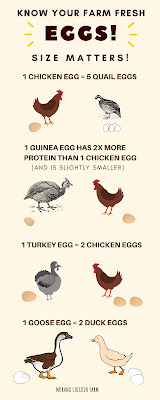Did you know that a guinea egg has more than twice the protein as a same sized chicken egg? Or that 5 quail eggs have almost the exact same nutritional content as 1 chicken egg, but are higher in calories? Or that ounce for ounce, duck eggs have more fat than goose eggs? Weird, right?
I spent a few hours crunching the numbers and I figured out how all the different types of farm fresh eggs, stack up against each other. Why? Well....I find it fascinating. Plus I was bored, but that's irrelevant! The point is, whether you raise chickens, ducks, geese, guineas, turkey or quail their eggs are all sort of the same, but kinda different.
I made a couple graphics so you could see exactly how things stack up. First up is an egg for egg comparison. This is how 1 chicken egg compares to 1 duck egg, guinea egg, quail egg etc. We expect larger eggs to be higher in calories, protein and other nutrients.
I was shocked to see that guineas eggs while smaller than chickens eggs, are actually much higher in protein. Another interesting fact is that while ducks eggs are not that much bigger than chicken eggs, they have a lot more fat content.
Click on images to enlarge.
After getting all these numbers down on 'paper' I had to take it one step further. Since all these eggs were different sizes, I needed to calculate the amounts in an equal amount of each egg. Let's level the playing field. A large chicken egg is around 50 grams. I took that number and divided in into each type of egg and came up with this comparison:
Now it makes a little more sense. As you can see, while you need 5 1/2 quail eggs to equal 1 chicken egg, they are identical in protein content. However, 1 1/4 guinea eggs, while weighing the same as 1 chicken egg, has 3 times the protein.
Even though 1 turkey egg is the same as 2 chickens eggs in weight, it is higher in calories and protein content. As far as duck and goose eggs go, they are way higher in calories than an equivalent of pretty much any other egg out there.
If you're trying to decide which poultry to raise for eggs though, the classic chicken egg wins! Even though 1 turkey egg equals 2 chicken eggs, turkeys don't even lay half as many eggs as a chicken does.
For smaller birds like quail, you would need 6 times as many to equal out to 1 laying chicken. Then again quail do take up less space, so there's clearly lots to consider!
Here are the average amount of eggs laid yearly:
- Chicken: 265
- Duck: 200-300
- Goose: 30-50
- Guinea: 100+
- Turkey: 17
- Quail: 300
Since we're all chicken people here, we understand that not all breeds of duck, chicken or goose lay the same amount of eggs. Obviously this also does not account for breed extremes, broodiness or age.
I'm sure you're wondering just where I found all this information since after all, I'm not a nutritionist. I spent way too much time on: MyProtein.com NutritionValue.org and Livestrong.com along with deciphering some incredibly boring medical journals, plus a whole bunch of poultry and breed sites.
Which brings me to my last interesting egg which belongs to the ostrich. One ostrich eggs weighs in at a whopping 3 lbs! Each ostrich egg is the equivalent of 24 chicken eggs and the ostrich lays about 40-60 eggs a year.
Which makes the ostrich the clear winner on egg production...as far as breakfast goes!
~L
Related reading: 7 More things you didn't know about guinea fowl.
Want information on raising chickens sent right to your email weekly? Click right here to join my list and get new posts sent directly to you the day they're published ... plus, you'll also get the free download '25 Ways to save money raising chickens'.





after months with no eggs, suddenly we have too many. Can I freeze some in ice cube trays? separated?
ReplyDeleteWhat an awesome problem to have! I usually mix the eggs together slightly and add about a pinch of salt. Then pour them into large ice cube trays. Once frozen pop them out and store in ziploc bags.
Delete~L
That is so interesting! We give our dogs a raw chicken egg every other day. We like them to have them for the protein. We have young guineas and this will be their first spring to lay. Looks like the guinea eggs will be good for the dogs too (though we may try hatching some as well)!
ReplyDeleteYes, the dogs will love them. Definitely try hatching some too, there is nothing cuter than a day old guinea!
DeleteWhat a cool post! I have high protein requirements and am mostly vegetarian... I wonder where I can get some guineas here in Idaho... hmm. Thanks for sharing all this valuable info!
ReplyDeleteIf you're looking to raise guineas yourself, I've ordered guinea from Ideal hatchery and have been very happy with them. I think almost all the big hatcheries carry them though. Good luck!
DeleteVery informative. Thank you for doing all that math for us!
ReplyDeleteEXACTLY what I'd wonder when bored. Followed my train of thought exactly and answered just about all my questions. Fantastic post. Love it!
ReplyDeleteThanks! My boredom gets me in trouble sometimes, but this time it actually turned out aok! lol
Delete